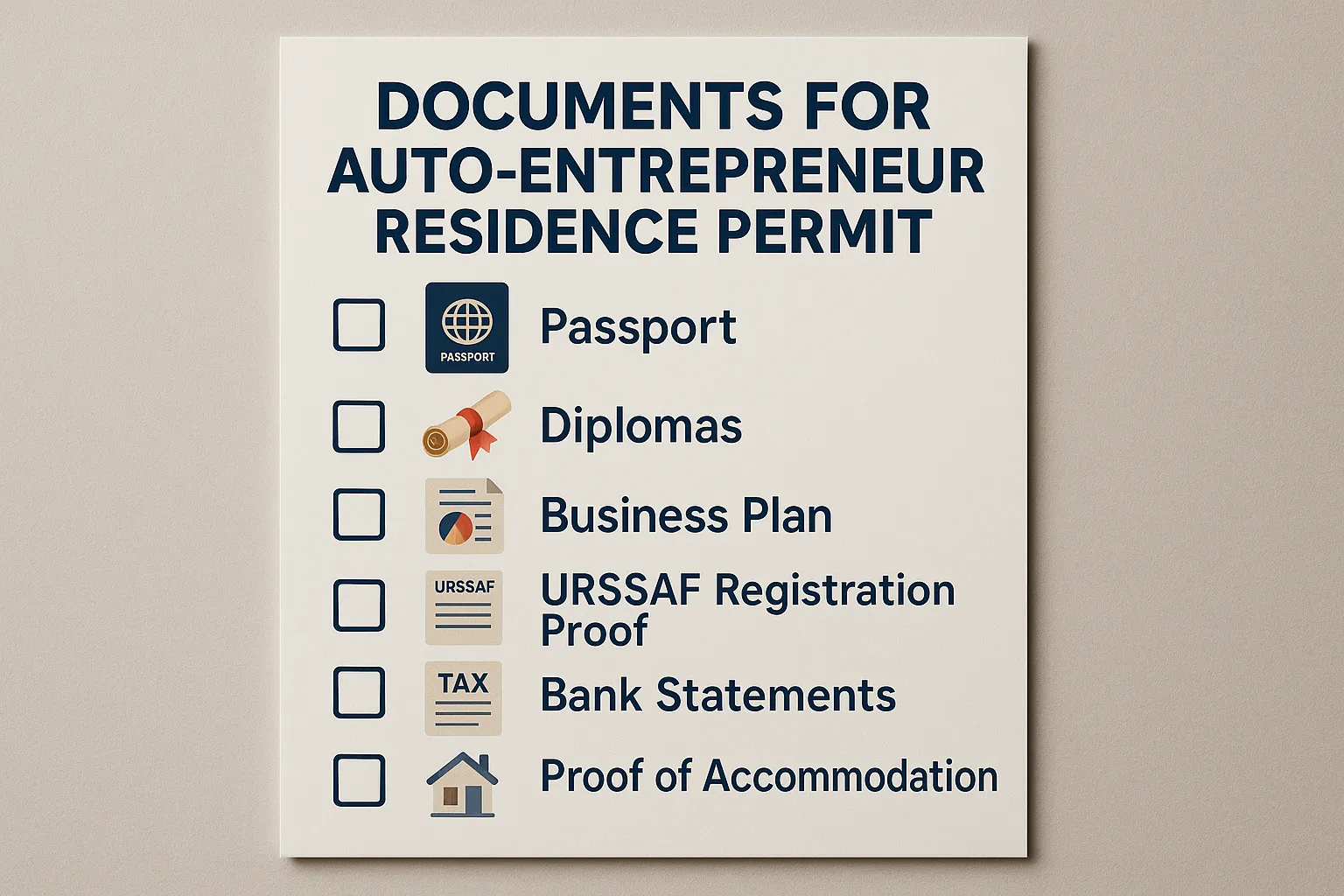Auto-Entrepreneur Permit: Turning Freelance Gigs into Legal Residency

Landing clients on Upwork or designing logos for Parisian cafés is exciting—until you remember that every euro you earn without legal status could put your stay in France at risk. The good news? France has a residence permit tailor-made for independent workers. When combined with the simplified auto-entrepreneur (micro-entrepreneur) business regime, freelancing can transform from an informal hustle into a solid pathway toward long-term residency and even citizenship.

Why the Auto-Entrepreneur Route Appeals to Foreign Freelancers
- Low start-up costs: register online in minutes, zero capital required.
- Simplified taxes: pay social charges and income tax as a percentage of turnover, declared each month or quarter.
- Professional credibility: official SIRET number lets you invoice French and EU companies.
- Residence stability: the “Entrepreneur/Profession libérale” carte de séjour can be renewed annually and later converted into a four-year “passeport talent” or 10-year resident card.
According to URSSAF statistics (2024), more than 72 000 foreign nationals operate under the micro-entrepreneur regime, with IT services, design, and consulting leading the pack.
1. Understanding the Auto-Entrepreneur Status vs. the Residence Permit
Many newcomers confuse the two.
| Term | What it is | Issued by |
|---|---|---|
| Auto-entrepreneur (micro-entrepreneur) | A tax and social‐security regime that simplifies bookkeeping and charges | URSSAF / INSEE |
| Carte de séjour “Entrepreneur/Profession libérale” | The residence permit that authorises you to stay and work as a self-employed person | Prefecture (Ministry of the Interior) |
Registering as a micro-entrepreneur alone does not legalise your stay if you’re undocumented. You still need the matching residence permit.
2. Are You Eligible?
- Legal entry: passport with visa or residence permit still valid (overstayers can sometimes regularise, but the bar is higher).
- Viable business project: prove realistic earnings that meet France’s annual minimum wage (SMIC) after expenses—about €21 400 gross for 2025.
- Clean criminal record: extrait de casier judiciaire from home country plus French bulletin n°3.
- Health insurance: French Social Security affiliation or private policy.
- Accommodation: lease, utility bills, or attestation d’hébergement covering at least six months.
Tip: Prefects look for consistency between projected turnover, client letters of intent, and your professional background. An architect turned crypto-trader raises eyebrows.
3. Choosing the Right Application Timeline
a) Applying From Abroad
- Request a long-stay visa (VLS-TS) stating “Entrepreneur/Prof. libérale” at the French consulate.
- Complete OFII formalities within three months of arrival.
b) Switching Status Inside France
If you already hold a different titre de séjour (student, employee, family) you may file for a change of status (changement de statut) two months before expiry.
c) Undocumented but Settled
Regularisation is possible after years of presence and proof of integration. ImmiFrance routinely defends clients facing an OQTF (ordre de quitter le territoire français). Seek legal advice early.
4. Step-by-Step Application Roadmap
- Draft a concise business plan (2–3 pages) with market study, pricing, and forecast turnover.
- Gather documents:
- Passport + current visa/permit
- Proof of address
- Three last bank statements showing solvency
- Diplomas or work certificates relevant to your trade
- Client letters or contracts (signed quotes count)
- Register as micro-entrepreneur on autoentrepreneur.urssaf.fr; download the receipt (récépissé d’enregistrement).
- Pay fiscal stamp (€225) online.
- Book a prefecture appointment via ImmiFrance’s appointment finder (internal link: https://immifrance.com/prefecture-appointment-assistance).
- Submit dossier in person; biometric fingerprints taken.
- Receive récépissé valid three months while case is examined.
- Collect your carte de séjour (usually 4–10 weeks later depending on prefecture).

5. Taxes, Social Charges, and Minimum Earnings
| Activity Type | Social Contribution Rate 2025 | Income Tax Option (Prélèvement libératoire) |
|---|---|---|
| Services (design, IT, consulting) | 21.2 % of turnover | 2.2 % |
| Commercial sales | 12.3 % | 1 % |
| Artisanal labour | 21.1 % | 1.7 % |
Declare turnover monthly online. If your annual revenue exceeds €77 700 (services) or €188 700 (sales) you must exit the micro-entrepreneur regime and adopt real-profit accounting.
Prefectures rarely renew a permit if your net income stays below the French minimum wage two years in a row, so track invoices carefully.
6. Renewal and Long-Term Residency Strategy
Year 1: receive a one-year carte de séjour.
Year 2–3: renew with updated URSSAF attestations, tax notices, and proof you paid contributions.
Year 4: if turnover stable and taxes paid, apply for a multi-year “passeport talent – entreprise innovante” or jump directly to the 10-year resident card after five years of uninterrupted residence.
After five years of legal stay, you may file a French citizenship application (naturalisation). ImmiFrance’s dedicated team can pre-audit your dossier to boost approval odds.
7. Common Pitfalls That Kill Applications
- Ignoring URSSAF mails: missing declarations triggers late fees and prefecture refusals.
- Under-quoting income: prefects check against bank statements.
- Copy-paste business plans: originality matters.
- Cash payments with no invoices: they won’t count.
- Missing appointment slots: Paris appointments often disappear in seconds—use automated monitoring tools.
8. How ImmiFrance Makes the Process Easier
ImmiFrance pairs you with an immigration lawyer who has completed hundreds of entrepreneur permits. Our platform offers:
- Tailored feasibility check: know your approval probability before paying a euro in taxes.
- Prefecture-specific document kits (Paris vs Lyon requirements differ).
- Real-time case tracker: follow every milestone from URSSAF receipt to card collection.
- Appeal support if you receive an OQTF or refusal.
Book a free 15-minute call: https://immifrance.com/contact
Frequently Asked Questions
Can I start invoicing clients while my permit is pending? Yes. The récépissé you receive after filing acts as temporary authorisation to work.
What if my turnover is low in the first year? Prefectures allow a ramp-up period, but you should show credible contracts and a clear upward trend by renewal time.
Can family members join me? After 18 months of legal stay, you may sponsor a spouse and minor children for a “vie privée et familiale” permit.
Is the auto-entrepreneur path accepted for remote IT consultants? Absolutely, provided your French clients sign service agreements specifying deliverables and rates.
How long does the whole process take? From dossier preparation to card collection, plan on 3–5 months in most regions; Paris and Seine-Saint-Denis can stretch to 6 months.
Turn Your Freelance Talent into a French Life—Start Now
Thousands of independents have secured their future in France through the auto-entrepreneur route. Don’t let paperwork or appointment slots derail your dream. Speak with an ImmiFrance expert today and get a personalised action plan that turns your gigs into a legitimate, renewable residence permit.
Ready to begin? Schedule your consultation at https://immifrance.com and step into the legal light.
